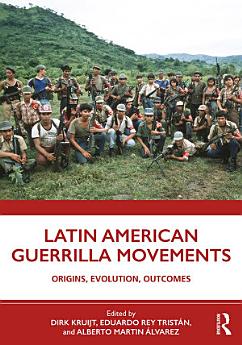Latin American Guerrilla Movements: Origins, Evolution, Outcomes
Tungkol sa ebook na ito
The book is divided in four thematic parts after two opening chapters that analyze the tradition of military involvement in Latin American politics and the parallel tradition of insurgency and coup effort against dictatorship. The first two parts examine active guerrilla movements in the 1960s and 1970s with case studies including Bolivia, Nicaragua, Peru, Argentina, Chile and Uruguay. Part 3 is dedicated to the Central American Civil Wars of the 1980s and 1990s in Nicaragua, El Salvador and Guatemala. Part 4 examines specific guerrilla movements which require special attention. Chapters include Colombia’s complicated guerrilla scenery; the rivalling Shining Path and Tupac Amaru guerrillas in Peru; small guerrilla movements in Mexico which were never completely documented; and transnational guerrilla operations in the Southern Cone. The concluding chapter presents a balance of the entire Latin American guerrilla at present.
Superbly accessible, while retaining the complexity of Latin American politics, Latin American Guerrilla Movements represents the best historical account of revolutionary movements in the region, which students will find of great use owing to its coverage and insights.
Tungkol sa may-akda
Dirk Kruijt is Professor Emeritus of Development Studies at Utrecht University, and currently is a research fellow at the Instituto Universitário de Lisboa and at the Centre for Military Studies at Stellenbosch University, South Africa. He has published widely about military governments and revolutions; insurgency and counterinsurgency; and urban violence and non-state actors. He has been a visiting scholar at universities and research institutes in Latin America and Europe. In addition, he has been a policy advisor to the Netherlands Ministry of Foreign Affairs, assigned to Latin America on multiple occasions. His most recent monograph is Cuba and Revolutionary Latin America (2017); Ethnography as Risky Business: Field Research in Violent and Sensitive Contexts (2019) was published in coedition with Kees Koonings.
Eduardo Rey Tristán is Full Professor of Latin American History at the University of Santiago de Compostela, Spain. After completing his PhD on the guerrilla movements in Uruguay, he has specialized in political violence and contemporary Latin American revolutionary movements. He has carried out long-time field research in the Rio de la Plata region and Central America. He is cofounder and coordinator of the Revolutionary New Left International Research Network on Political Violence. He has published monographs, articles and book chapters in several European and American countries, among them: La Izquierda Revolucionaria Uruguaya, 1955–1973 (2006), and Revolutionary Violence and The New Left: Transnational Perspectives (coedited with Alberto Martín, New York: Routledge, 2016). He is currently working on a political biography of the Italian left-wing editor and activist Giangiacomo Feltrinelli (expected in 2020).
Alberto Martín Álvarez holds a PhD on Latin American Studies from the Universidad Complutense de Madrid. He is currently Distinguished Professor at the Department of Public Law of the Universitat de Girona (Spain). He has been full professor at the Instituto Mora (Mexico City) and visiting researcher at several universities and research centers in Europe and Latin America. He is cofounder and coordinator of the Revolutionary New Left International Research Network on Political Violence. He has also undertaken extensive research on the origins and development of the Salvadoran revolutionary left. Among his main publications are: Revolutionary Violence and the New Left: Transnational Perspectives (London: Routledge, 2016, with Eduardo Rey, eds.) and the monograph From Revolutionary War to Democratic Revolution: The Farabundo Martí National Liberation Front (FMLN) in El Salvador (2010).






